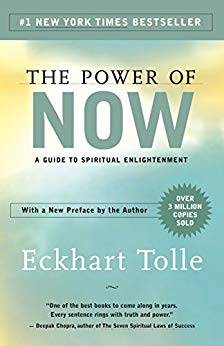

This article is an excerpt from the Shortform summary of "The Power of Now" by Eckhart Tolle. Shortform has the world's best summaries of books you should be reading.
Like this article? Sign up for a free trial here .
What is The Power of Now about? What is the main cause of unhappiness, according to author Eckhart Tolle?
In his book The Power of Now, Eckhart Tolle proposes that the main cause of unhappiness and lack of fulfillment for most people is a lack of presence in their moment-to-moment experience. He walks the reader through his methods for quieting their thoughts and fears to find fulfillment through presence.
Below is a brief overview of Eckhart Tolle’s book The Power of Now: A Guide to Spiritual Enlightenment
The Power of Now: A Guide to Spiritual Enlightenment
Many of us spend our lives searching for peace, joy, and fulfillment. We look for it in different ways: through accomplishments, relationships, experiences, and material possessions. In his book The Power of Now, Eckhart Tolle proposes that the only way to find true peace and fulfillment is through being solely and intensely present in each moment. The more we live in the Now, the more we are able to connect with our true selves and experience life fully, without extraneous thoughts and speculations clouding our minds and altering our lens of the world.
The Problem: We Spend Much of Our Time Consumed in Thought
What will I make for dinner tonight? I should have spoken up during that meeting. I wonder if I’ll get that promotion. I really want that car. I have to remember to buy bread and eggs on the way home. All of these thoughts distract us from experiencing the present moment.
Our endless thoughts often focus on the past or the future. However, we have no control over either — the past is over and the future isn’t here yet — so we are in an endless cycle of wasting our mental and emotional energy on things we can’t control. The only moment we can impact is the present.
When you focus on the past, you feel guilt, regret, resentment, sadness, bitterness, and unforgiveness. You also carry old hurt from your pain-body, the invisible entity of cumulative pain you have experienced in your life. The pain body is like a parasite, feeding on negativity and driving us to think and act in negative ways.
- (Shortform example: Someone who has experienced abandonment is likely to be sensitive to comments or situations that trigger that pain. In response, her pain-body may push her to attack others by lashing out, or attack herself by blaming herself and feeling victimized. We’ll talk more about the pain-body and how to overcome it in the full summary.)
When you focus too much on the future, you create anxiety, tension, stress, and worry. In the full summary, we will explore how to plan for the future while remaining present.
- (Shortform example: You have a pile of bills due next week and are consumed with worry about how you will be able to make ends meet. Instead of dwelling in this future situation, make a plan for how to pay off the bills and then accept that there’s nothing more you can do in this moment. Even if your plan doesn’t solve the issue — as that may not always be possible — spending the meantime panicking creates extra negativity, exhausts your mental and emotional energy, and prevents you from being present. You are gaining nothing from the anxiety.)
Your Ego Causes Problems
Why are so many of us driving ourselves crazy thinking about things we can’t control, and distracting ourselves from the real moment we are experiencing right now? The inner voice in your head, called the ego, is responsible for this endless internal monologue. The ego is a part of your mind that tries to control your thinking, emotions, and behavior.
Your ego projects a false identity, made up of your membership in groups and communities (such as gender, nationality, profession, and religion) and your past pain and experiences. The ego tells you that your memories, experiences, religion, upbringing, education, career, gender, political beliefs, and nationality make you who you are.
All these aspects of the ego-created identity are based on external forces. If you believe that these external factors — like life experiences, profession, and political affiliation — make you you, then any new experiences, career changes, and challenges to your political beliefs have the potential to shake your identity.
In fact, your ego is distracting you from connecting with your true self or Being. Your Being is a purer energy that lives within you, unaffected by external forces and circumstances.
You can only be your true self when you are present, when your thoughts are not focused on the past, future, or the ego-created false identity. By connecting with your true self through presence, you access inner peace.
- The ego, then, prevents you from being present and from enjoying a state of inner peace.
You can disconnect from your ego and connect with your true self by observing your thoughts, as if you were a third-party witness to your own mind.
- Try thinking, “I wonder what my next thought will be.” Wait and watch. Notice that your thoughts will likely stall for a moment while you are in this state of presence and alertness. You’ve just observed your mind.
- When you can separate yourself from your thoughts — even if only for a moment — then you have briefly disconnected from your ego. In this moment, you were fully present and in touch with your true self. We’ll dive deeper into this in the full summary.
The Solution: Be Present in Every Moment
The past only exists in memories and the future only exists in projections, so when you are present, you experience the only moment that is real — Now. Presence is the only antidote to the control of the ego and the pain-body.
- Much of our pain and distress is self-imposed, from feeding into the pain-body’s negativity and the ego’s power to fill our minds with worry about the past and future.
Being present does not change your external circumstances. When we face hardships in life, being present allows us to tackle them moment by moment. Added stress from our ego-controlled, worried thoughts only makes the obstacles seem more overwhelming. When we are present, we have more mental capacity to face these challenges.
Life consists of cycles of success and failure; each one is a necessary precedent of the other. When you are present, you must accept the lows as much as the highs as part of the reality of the Now. Why fight a cycle that is inevitable?
If you are wishing that a situation were different in some way, then your thoughts are in the past, future, or some hypothetical scenario — and you are not in the present.
If you are facing a difficult or unpleasant situation, you have three options:
- Change the situation (if you can).
- Leave the situation (if you can).
- Accept it as it is. If you can’t change or leave the situation, you may be forced to accept it forever, or at least until things change and you can take another action later.
Accepting the present means to acknowledge that it already exists, and that no amount of wishing, complaining, or worrying will change this current moment. You can, however, take one of the first two actions and make steps to change or leave the situation.
Does this seem easier said than done? Presence is a simple concept but is not necessarily an easy practice. Most of us are in the habit of letting our egos run the show, so keeping our focus on the present will be like a muscle you strengthen with time and practice.
How to Be More Present
We will explore how to put this into practice and be more present in your everyday life. The key is maintaining awareness of both your mind and body.
Your body is a gateway to your mental and emotional state.
- Do you ever look down during a tense conversation and notice your hands are clenched in fists? Or wake up in the morning to realize you were grinding your teeth in your sleep? Or get up from working intently on a project and feel how stiff your neck is? You may not have consciously registered how stressed or tense you were, but your body gives you telltale signs.
- Let your body clue you in to when you need to take a moment and bring your focus back to the present.
By the same token, your body is a tool to get your mind back in the present. Putting your focus on your body will bring your mind back to where you are in this moment.
- Connect with the inner body, or your internal state of being: Pay attention to your breathing. Relax your body. Close your eyes. Take a few deep breaths.
- The more often you can connect with your inner body, the more presence you are able to maintain. Once you are present, you will not stay there — you will need to remind yourself and practice, and eventually you will spend more time in the Now.
Benefits to Others by Being Present
Being present benefits you as well as those around you. Presence allows you to have true connections and relationships with other people because you are interacting with them from a place of inner peace.
By contrast, when your ego is running the show, you often react to people based on the worry, stress, fear, anxiety, guilt, pain, or resentment your ego and pain-body are generating. This affects everything from day-to-day interactions to friendships and romantic relationships.
- (Shortform example: If your partner says something to you that triggers your pain-body — such as a comment about what a diligent worker you are, whereas your ex blamed your relationship’s disintegration on your overworking — you are likely to react defensively or lash out. But if you are present and resist the pain-body’s power, you can recognize that this comment has nothing to do with your ex.)
Humans’ collective lack of presence sends negative energy into the world around us. Cumulatively, that negative energy is having a damaging effect on the planet. (Shortform note: This is a more minor point that is never fully fleshed out, but mentioned sporadically throughout the book.)
———End of Preview———

Like what you just read? Read the rest of the world's best summary of "The Power of Now" at Shortform . Learn the book's critical concepts in 20 minutes or less .
Here's what you'll find in our full The Power of Now summary :
- Why you feel pain from the past, and how to get rid of it
- How to be more present and stop worrying about the future
- The 8 key ways to achieve mindfulness






